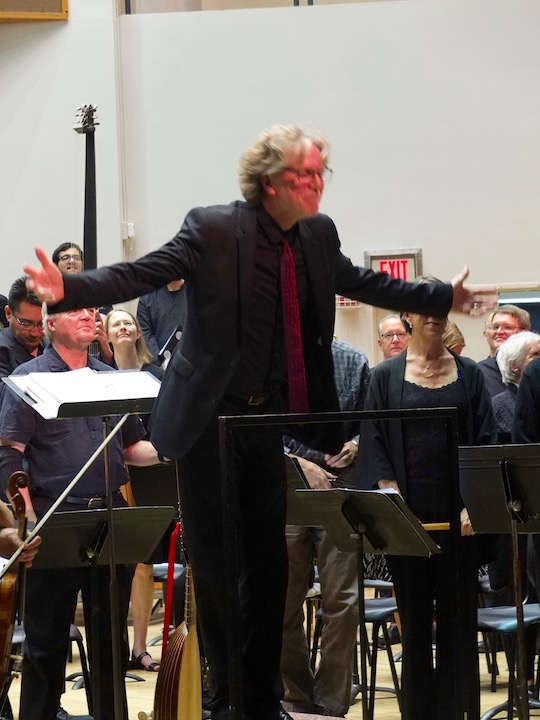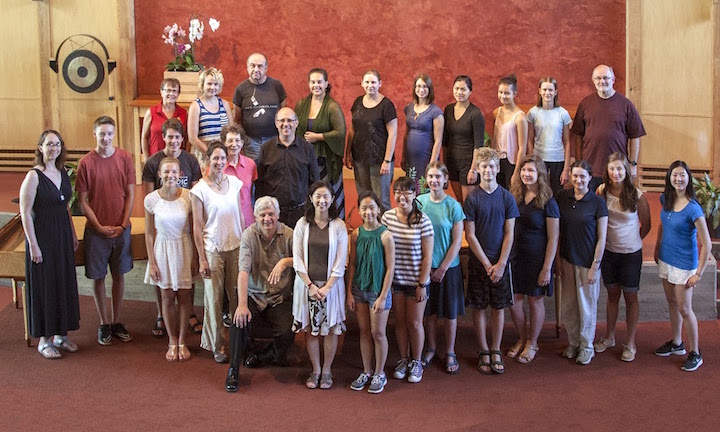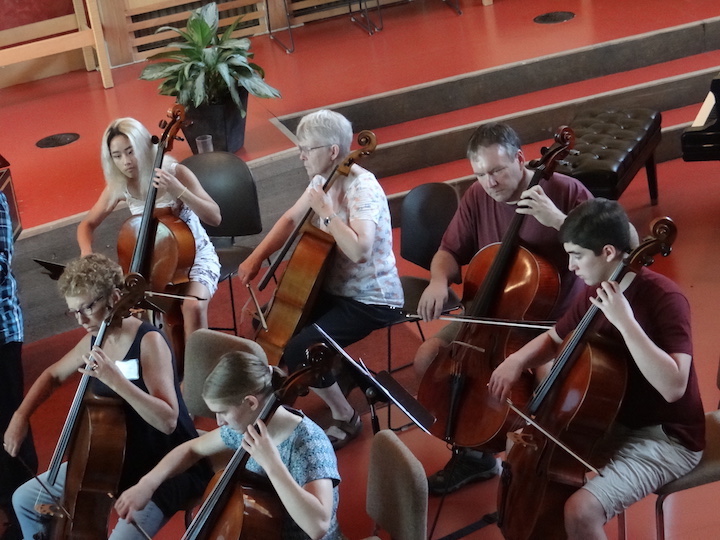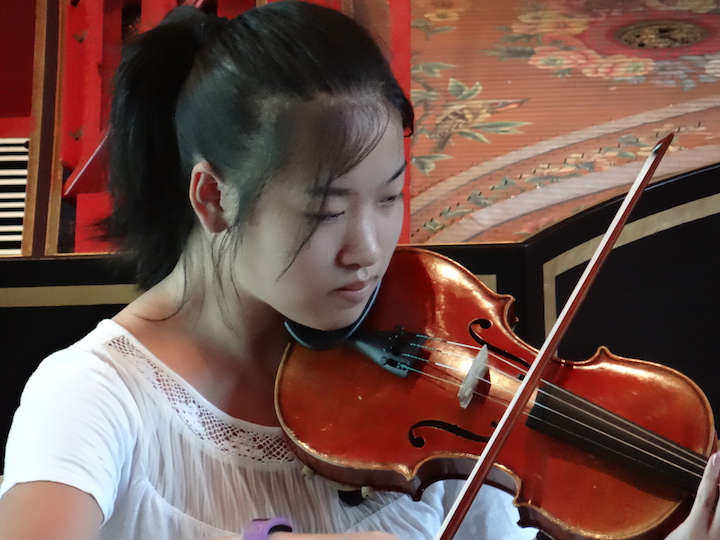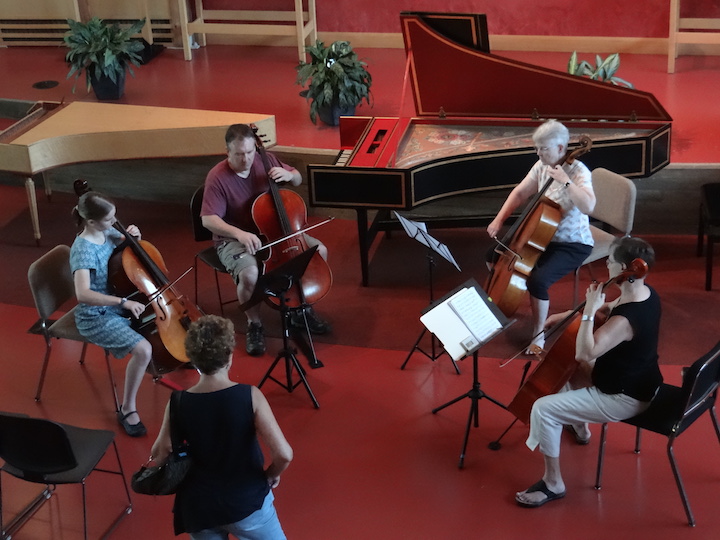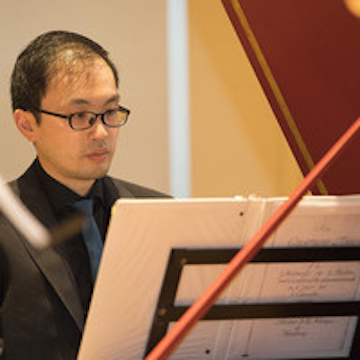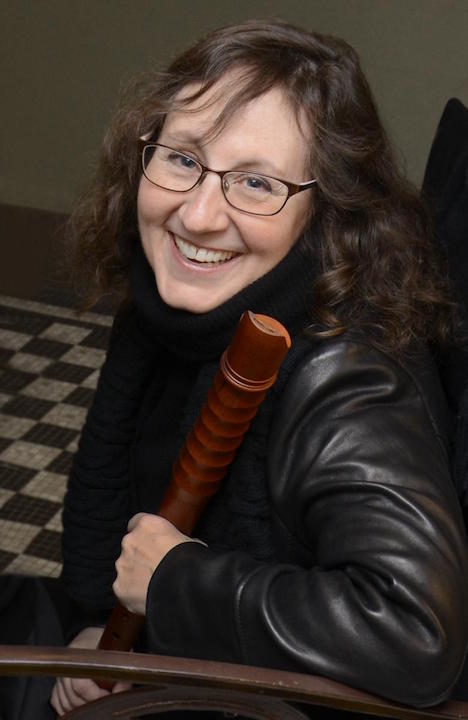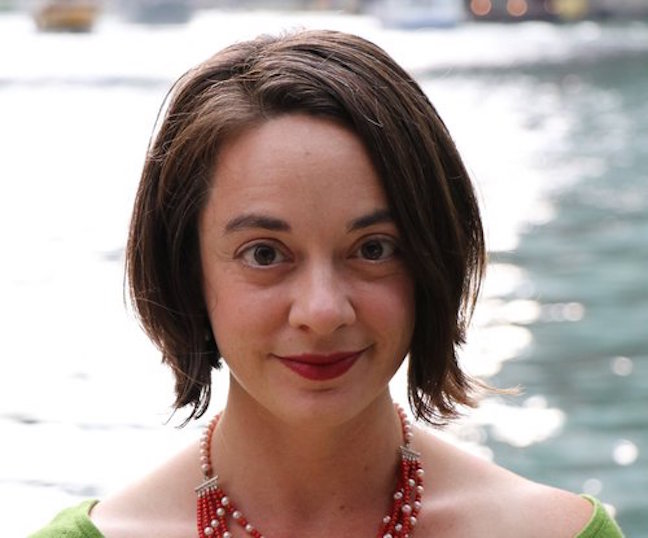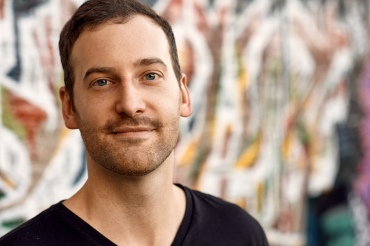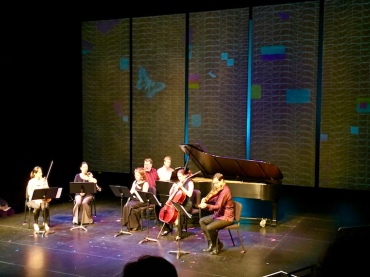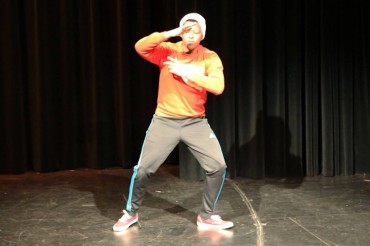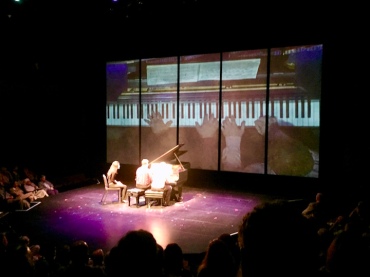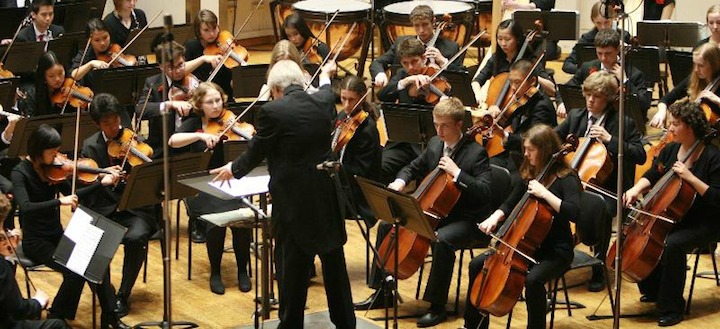The Well-Tempered Ear
Is impromptuing the impromptu ok?
2 Comments
PLEASE HELP THE EAR. IF YOU LIKE A CERTAIN BLOG POST, SPREAD THE WORD. FORWARD A LINK TO IT OR, SHARE IT or TAG IT (not just “Like” it) ON FACEBOOK. Performers can use the extra exposure to draw potential audience members to an event. And you might even attract new readers and subscribers to the blog.
By Jacob Stockinger
Recently, The Ear heard an unusual version of the very familiar Fantaisie-Impromptu for solo piano by Chopin.
It was played by the 35-year-old, prize-winning Russian pianist Pavel Kolesnikov (below). You can hear his performance in the YouTube video at the bottom.
What made it unusual is that the pianist took liberties and added passing notes or runs and a melodic overlay to part of it.
It seemed odd at first.
Why mess with Chopin, who was such a meticulous crafter of beauty?
But when you think about it, it makes a certain sense.
It is, after all, an impromptu. And an impromptu is based on and suggests improvisation.
So why not impromptu the impromptu? Why not add some extra spontaneity or variation, since many impromptus take the form of a theme with variations and elaborations.
These days performers are even expected to elaborate the Baroque repertoire, especially Bach and Handel. And it is becoming standard practice to do so with Mozart’s piano sonatas and concertos.
Now the Fantaisie-Impromptu is by far the most popular of Chopin’s four impromptus, no doubt in part because its lovely middle section melody inspired the classic Vaudeville pop song “I’m Always Chasing Rainbows.”
But the Fantaisie-Impromptu, the last composed, is The Ear’s least favorite of the four impromptus that Chopin wrote. And Chopin apparently didn’t like it much either. He wanted it to remain unpublished and destroyed.
It made me want to know: What might the same pianist do with the other three great impromptus by Chopin?
Or the famous ones by Schubert and the less famous ones by Fauré?
Listen to the 5-minute performance and tell The Ear what you think of the ornamented version that Kolesnikov plays?
Which one of four is your favorite Chopin impromptu?
What impromptus by Schubert and Fauré do you especially like? Would changing the score work with them?
What other impromptus by other composers do you suggest listening to and playing — and perhaps even ornamenting?
The Ear wants to hear.
Tags: #BlogPost, #BlogPosting, #FacebookPost, #FacebookPosting, #Prize-Winning, #YouTubevideo, Apple, Arts, audience, Bach, Baroque, beauty, Beethoven, blog, Cello, change, Chopin, choral music, Classical music, composer, Concert, concerto, Craft, Early music, elaboration, eloaborate, Facebook, famous, Fantaisie-Impromptu, Faure, favorite, Google, Google Alert, great, Handel, hear, impromptu, improvisation, improvise, Jacob Stockinger, Johann Sebastian Bach, kliberty, liberties, link, listen, Ludwig van Beethoven, Madison, melody, mess, Mozart, Music, odd, opera, Orchestra, ornament, ornamentation, OS, Pavel Kolesnikov, performance, Pianist, Piano, play, pop music, popular, publish, repertoire, repertory, Russia, Russian, Schubert, score, sense, share, solo]performer, Sonata, spontaneity, symphony, tag, The Ear, theme, think, United States, University of Wisconsin-Madison School of Music, University of Wisconsin–Madison, unpublished, variations, Vaudeville, version, Viola, Violin, vocal music, want, Wisconsin, Wolfgang Amadeus Mozart, you, YouTube
Today – Monday, March 22 — is Day 6 of the 2021 online Bach Around the Clock festival. The program features string, keyboard, percussion and vocal music with some interesting transcriptions
Leave a Comment
PLEASE HELP THE EAR. IF YOU LIKE A CERTAIN BLOG POST, SPREAD THE WORD. FORWARD A LINK TO IT OR, SHARE IT or TAG IT (not just “Like” it) ON FACEBOOK. Performers can use the extra exposure to draw potential audience members to an event. And you might even attract new readers and subscribers to the blog.
By Jacob Stockinger
Yesterday – Sunday, March 21 — was the actual birthday, the 336th, of Johann Sebastian Bach (1685-1750).
But the 10-day virtual and online celebration being held by Bach Around the Clock (BATC) continues.
Here are the pieces and performers that will take place.
The Ear is especaially pleased by some of the transcriptions, which offer more proof of just how indestructible and versatile Bach’s music remains.
Particularly interesting is the string quartet version of the famous cantata “Wachet auf” (Sleepers, Wake) and the Three-Part Inventions or Sinfonias transcribed for marimba, and played by Sean Kleve (below), a UW-Madison graduate who performs with the critically acclaimed experimental Madison-based percussion ensemble Clocks in Motion.
Monday’s program is available starting at 8 a.m.
Click here and scroll down to Day 6 to view.
Performers
• Minuet 2 in G Major, Anh 116; Suite in G Minor, BWV 822; Gavotte from Double Concerto in D Minor, BWV 1043, I. Vivace. Suzuki Strings Sonora Ensemble
• Cantata 140: “Wachet Auf” (Sleeper, Wake), arranged for string quartet. St. Croix Valley String Quartet: Janette Cysewski and Debbie Lanzen, violins; Dianne Wiik, viola; and Joel Anderson, cello.
• French Suite No. 3 in B Minor for keyboard, BWV 814: Sarabande, Anglaise, Menuett and Trio. Kris Sankaran
• Sinfonia 1 in C Major, BWV 787; Sinfonia 7 in E Minor, BWV 793; Sinfonia 10 in G Major, BWV 796; Sinfonia 11 in G Minor, BWV 797; Sinfonia 15 in B Minor, BWV 801. Sean Kleve, marimba. (You can hear Glenn Gould playing the original version of the first Sinfonia in the YouTube video at the bottom.)
• Chorale: We thank Thee, Lord, for sending. Katie Hultman, soprano, and Kenneth Stancer, organ
Live and Recorded Evening Program at 7 p.m.
Click here and scroll down to Day 6 to view.
BATC audiences will remember pianist Lawrence Quinnett (below) from his exquisite renderings of selections from The Well-Tempered Clavier, at the 2018 Festival.
Quinnett, on the piano faculty of Livingstone College, returns in 2021 to give a brief talk on his approach to ornamentation in the six French Suites, as a prelude to his live performance of Suite No. 5. The floor will open for questions, followed by Quinnett’s recorded performance of the remaining five Suites.
Tags: #BachAroundtheClock, #BachCantata, #BaroqueMusic, #BaroqueOrnamentation, #BlogPost, #BlogPosting, #ChamberMusic, #ChoralMusic, #CityofMadison, #ClocksinMotion, #CriticallyAcclaimed, #DoubleConcerto, #FacebookPost, #FacebookPosting, #FrenchSuite, #GlennGould, #JacobStockinger, #JesusChrist, #JohannSebastianBach, #KeyboardMusic, #LawrenceQuinnett, #LiveMusic, #LiveStreaming, #LivingstoneCollege, #MadisonWisconsin, #MeadWitterSchoolofMusic, #MusicEducation, #OnlineConcert, #OnlineFestival, #PercussionEnsemble, #PercussionMusic, #RecordedMusic, #SeanKleve, #Sleeps, #SonoraStrings, #StringMusic, #StringQuartet, #SuzukiMethod, #SuzukiStrings, #TheEar, #TheUW, #TheWell-TemperedClavier, #Three-PartInvention, #UniversityofWisconsin-Madison, #VirtualConcert, #VirtualFestival, #WachetAuf, #Well-TemperedClavier, #YouTubeChannel, #YouTubevideo, 1685\2021, Anglaise, answer, approach, arrange, arrangement, Arts, audience, Bach, Bach Around the Clock, Baroque, BATC, birthday, blog, Blog post, blog posting, brief, BWV, Cantata, celebration, cellist, Cello, Chamber music, channel, choral music, Chorale, Christ, Classical music, classicalmusic, clavier, Clocks in Motion, composer, Concert, concerto, continue, critically acclaimed, day, double, double concerto, Early music, evening, experimental, exquisite, Facebook, faculty, famous, festival, floor, forward, French, French Suite, Gavotte, Glenn Gould, harpsichord, harpsichordist, indestructible, interesting, Jacob Stockinger, Jesus, Johann Sebastian Bach, Keyboard, Lawrence Quinnett, like, link, live, live music, livestream, Livingstone College, Lord, Madison, major, march, marimba, marimbist, Mead Witter School of Music, menuett, minor, morning, Music, Music education, offer, online, open, ornamentation, percussion, Percussion Ensemble, Percussion music, perform, performer, Pianist, Piano, piece, play, please, pleased, professor, program, proof, Q&A, question-and-answer, questions, recorded, recorded music, remain, renderings, return, sarabande, Sean Kleve, selection, share, sinfonia, Sleepers, Sonora Strings, start, string music, String quartet, Student, subscriber, Suite, Suzuki Method, Suzuki Strings, tag, talk, temper, thank, The Ear, The Well-Tempered Clavier, Thee, Three-Part Invention, transcribed, transcription, trio, United States, University of Wisconsin-Madison School of Music, University of Wisconsin–Madison, UW, UW-Madison, versatile, video, Viola, Violin, violinist, violist, virtual, vivace, vocal music, Wachet auf, Wachet auf ruft uns die Stimme, wake, Well-Tempered Clavier, Wisconsin, YouTube
Bach Around the Clock 2021 will incorporate many new aspects – including more audiences and artists of color — into the 10-day free virtual festival that runs March 17-26
Leave a Comment
PLEASE HELP THE EAR. IF YOU LIKE A CERTAIN BLOG POST, SPREAD THE WORD. FORWARD A LINK TO IT OR, SHARE IT or TAG IT (not just “Like” it) ON FACEBOOK. Performers can use the extra exposure to draw potential audience members to an event. And you might even attract new readers and subscribers to the blog.
By Jacob Stockinger
The Ear has received the following update about Bach Around the Clock (BATC), the annual March free event to celebrate the birthday of Johann Sebastian Bach (below). Like last year, the year’s will be virtual and online and spread out over 10 days, from March 17 to March 26.
The BATC 2021 Festival is shaping up brilliantly. We have about 50 participants signed up so far, with musical selections totaling more than eight hours.
As always, it has a nice mix of ages and levels of performers, from young students to seasoned professionals. It also runs from traditional instruments like the violin, viola, cello, oboe, bassoon, piano and organ as well as the human voice to more unusual instruments like the clavichord, 6-string electric bass and a saxophone quartet.
We are so grateful to all the participants who have volunteered to share their talents. (Below is the Webb Trio playing last year from home.)
Last year’s virtual format forms the basis of this year’s festival, but we’ve expanded on that in some very exciting ways.
BATC board member Melanie de Jesus (below) is producing two mini-films aimed at making the festival more accessible to participants. For the tech-challenged among us, the “How to Film Yourself” video will make it easier for musicians to participate virtually.
This film will be available this THURSDAY, Feb. 25, in time to help participants film and submit their performances by the March 5 deadline. Would you like to perform? For information about signing up for slots. Click here to let us know!
Make your own recording or request a time slot at a BATC venue where a professional videographer will create a recording for you to keep. Harpsichord, piano and organ are available.
Melanie’s “Bach for Kids” film will be published during the festival, and will introduce basic musical concepts to the youngest participants. It will culminate in a sing-along, play-along, dance-along performance of some simple Bach tunes, as demonstrated by some (very) young students at the Madison Conservatory, where de Jesus is the director.
Another significant new element of this year’s festival will be our evening Zoom events, including receptions with performers, and guest artists giving special performances, lecture/demos, master classes and panel discussions.
In keeping with this year’s theme of “Building Bridges Through Bach,” we will celebrate and feature musicians and guest artists of color.
We are thrilled to announce Wisconsin Public Radio music host Jonathan Overby (below) as our keynote speaker. Overby’s work to research and demonstrate how music, especially sacred music, serves as a cultural bridge, has taken him all over the planet. His core values are in close alignment with the theme of this year’s festival, and his address will set the tone for the rest of the festival.
The virtual format enables us to bring in guest artists from afar. Lawrence Quinnett (below), on the piano faculty of Livingstone College, a private, historically black college in Salisbury, North Carolina, will perform all six French Suites, and give a brief talk on his approach to ornamentation. (You can hear Quinnett performing French Suite No. 1 by Bach in the YouTube video at the bottom.)
Clifton Harrison (below, in photo by Stephen Wright), violist in the Kreutzer String Quartet, in residence at Oxford University in England, will give a master class for interested BATC participants. Information on how to audition for this opportunity will be shared very soon.
We are extremely pleased that Trevor Stephenson (below), artistic director of the Madison Bach Musicians, will give an evening lecture and demonstration on the Goldberg Variations.
Through his performances, interviews and extremely popular pre-concert lectures, Trevor has served as a very important builder of bridges to the music of J.S. Bach in Madison and beyond. It would be hard to overstate the impact of Trevor’s work to make Bach’s music accessible to local audiences of all ages and backgrounds. We’re sure viewers will enjoy this event.
An astonishing new development resulted from BATC’s outreach efforts to local high schools: Steve Kurr (below), orchestra director at Middleton High School and former conductor of the Middleton Community Orchestra, decided to incorporate BATC into his curriculum this semester.
Fifteen of his students will perform for BATC, filmed by four other students, and then the students will all view the performances and write essays about them.
BATC is delighted with this creative initiative, looks forward to receiving the videos from this cohort of students, and hopes to expand on this kind of outreach in future years. Maybe we can include the final essays on our website, if the students agree.
There are a few other ideas still under construction; perhaps a panel discussion with educators, or one with local musical bridge-builders (aka “Angels in our Midst”)?
Please help us keep this festival free and open to all.
Bach Around The Clock is a unique program in our community. It offers everyone the opportunity to share their love of the music of Bach. There is no charge to perform or to listen.
But the festival is not free to produce! BATC provides venues, instruments, videographers, editors, and services for performers and audience.
We need your support!
Click on there link below to donate securely online with a PayPal account or credit card: https://www.paypal.com/donate/?cmd=_s-xclick&hosted_button_id=WU7WWBW5LBMQJ
Or you can make a check out to Bach Around The Clock and mail it to: Bach Around The Clock, 2802 Arbor Drive #2, Madison, WI 53704
Bach Around The Clock is a 501(c)(3) organization; your donation is tax-deductible as allowed by the law. Donors will be listed on the acknowledgments page of the BATC website .
For the latest updates, please visit our website, bachclock.org, or our Facebook page, facebook.com/batcmadison.
We hope you will join us.
Marika Fischer Hoyt, Artistic Director, Bach Around The Clock, (608) 233-2646
Tags: "Goldberg" Variations, #501(c)(3), #ArtisticDirector, #BachAroundtheClock, #BachforKids, #BaroqueMusic, #BaroqueOrnamentation, #BlackCollege, #BlogPost, #BlogPosting, #BoardofDirectors, #BuildingBridgesThroughBach, #ChamberMusic, #ChoralMusic, #CityofMadison, #CliftonHarrison, #CoreValues, #CreditCard, #FacebookPost, #FacebookPosting, #FrenchSuites, #Goldberg"Variations, #GuestArtist, #HighCulture, #HigherGround, #HistoricallyBlackCollegesandUniversities, #HomeWebpage, #HomeWebsite, #InstrumentalMusic, #JacobStockinger, #JohannSebastianBach, #JonathanOverby, #KeynoteSpeaker, #KreutzerStringQuartet, #LawrenceQuinnett, #LivingstoneCollege, #MadisonBachMusicians, #MadisonConservatoryofMusic, #MadisonSymphonyOrchestra, #MadisonWisconsin, #MakeMusicMadison, #MarikaFischerHoyt, #MeadWitterSchoolofMusic, #MelaniedeJesus, #MiddletonCommunityOrchestra, #MiddletonHighSchool, #MusicEducation, #NonprofitOrganization, #NorthCarolina, #OfColor, #OnlineConcert, #OnlineFestival, #OxfordUniversity, #PanelDiscussion, #PayPal, #PianoFaculty, #Pre-concertLecture, #Quartet-in-Residence, #SacredMusic, #SaxophoneMusic, #SecularMusic, #SteveKurr, #StringQuartet, #TheEar, #TheUK, #TheUW, #TimeSlot, #TrevorStephenson, #VirtualConcert, #VocalMusic, #WisconsinChamberOrchestra, #WisconsinPublicRadio, #YouTubevideo, #ZoomMeeting, 501(3)(c), accessible, address, afar, age, aim, alignment, angels, annual, another, approach, artist, Artistic director, Arts, astonishing, audience, audition, Bach, Bach Around the Clock, Bach for Kids, background, Baroque, Baroque music, Bassoon, bassoonist, BATC, beyond, birthday, black college, blog, Blog post, blog posting, board member, bridges, brillitant, buikding, Building Bridges Through Bach, celebrate, cellist, Cello, challenge, Chamber music, choral music, Chorale, Christian, church, Classical music, clavichord, click, Clifton Harrison, composer, Concert, conductor, core values, creative, credit card, cultural, culture, curriculum, dance, dance-along, day, deadline, decide, delight, demo, demonstrate, demonstration, development, director, donate, donation, Early music, easier, eassy, editor, electric bass, element, England, enjoy, evening, exciting, expand, Facebook, feature, festival, film, format, free, French Suites, future, grateful, guest, guest artist, hard, harpsichord, HBUC, help, Higher Ground, historically, historically black universities and colleges, Home, home website, hope, hours, human, human voice, impact, incorporate, information, instrument, instrumental, instrumental music, interview, Jacob Stockinger, Johann Sebastian Bach, Jonathan Overby, keynote, kids, kind, know, Kreutzer String Quartet, Lawrence Quinnett, lecture, level, link, Livingstone College, local, Lutheran, Madison, Madison Bach Musicians, Madison Conservatory of Music, Madison Symphony Orchestra, mail, make, march, Marika Fischer Hoyt, master class, masterclass, Mead Witter School of Music, Melanie de Jesus, Middleton Community Orchestra, Middleton High School, mix, Music, Music education, musical, Musician, new, Nice, nonprofit, Nonprofit organization, North Carolina, of color, online, opportunity, Orchestra, organ, organist, ornamentation, outreach, overstate, overstatement, Oxford University, panel discussion, participants, performance, performer, Pianist, Piano, piano faculty, planet, play, play-along, pleased, popular, post, posting, pre-concert lecture, private, produce, professional, Quartet, reception, recording, research, residence, sacred, sacred music, Salisbury, Saxophone, seasoned, secular, secular music, selections, semester, services, share, sign-up, significant, simole, sing-along, Singing, slot, Sonata, soon, speaker, Steve Kurr, String quartet, Student, submit, talent, tax-deductible, teach, Teacher, technical, technology, The Ear, theme, thrilled, time slot, tone, total, traditional, Trevor Stephenson, tunes, UK, United States, University of Wisconsin-Madison School of Music, University of Wisconsin–Madison, unusual, update, US, UW, UW-Madison, venue, video, videographer, Viola, Violin, violinist, violist, virtual, visit, vocal music, voice, volunteer, way, Website, Wisconsin, Wisconsin Chamber Orchestra, wisconsin public radio, work, write, year, you, young, yourself, YouTube, Zoom
Classical music: Madison Bach Musicians will hold their sixth annual summer workshops on baroque music online July 28-31. Registration ends July 26
Leave a Comment
PLEASE HELP THE EAR. IF YOU LIKE A CERTAIN BLOG POST, SPREAD THE WORD. FORWARD A LINK TO IT OR, SHARE IT or TAG IT (not just “Like” it) ON FACEBOOK. Performers can use the extra exposure to draw potential audience members to an event. And you might even attract new readers and subscribers to the blog.
By Jacob Stockinger
The Ear has received the following announcement to post from the Madison Bach Musicians – who are known for their authentic interpretations with period instruments and historically informed performance practices:
Here is a preview video on YouTube video:
Tags: #18thCentury, #BaroqueCello, #BaroqueContinuo, #BaroqueOrnamentation, #BlogPost, #BlogPosting, #ChamberMusic, #CoronavirusPandemic, #COVID-19, #FacebookPost, #FacebookPosting, #FacultyMember, #HistoricallyInformedPerformancePractices, #HomeWebsite, #InPerson, #InstrumentalMusic, #JacobStockinger, #Jason Moy, #JasonMoy, #JohannSebastianBach, #KangwonKim, #LisetteKielson, #MadisonBachMusicians, #MarthaVallon, #MicahBehr, #MusicalInterpretation, #PeriodInstruments, #Pre-concertLecture, #SarahEdgar, #SignUp, #TheEar, #TrevorStephenson, #YouTubevideo, 18th century, announcement, annual, articulation, Arts, audience, authentic, Bach, Baroque, basics, blog, bow, cellist, Cello, Chamber music, class, Classical music, compare, composer, continuo, coronavirus, curiosity, dance, deadline, description, digital, early, Early music, Facebook, faculty, forward, fugue, Greensleeves, ground, group, help, historically informed performance practices, home website, in person, indulge, influence, instrumental music, instrumentalists, interaction, interpretation, J.S. Bach, Jacob Stockinger, Johann Sebastian Bach, Kangwoo Kim, known, lessons, like, link, Lisette Kielson, Madison, Madison Bach Musicians, Martha Vallon, MBM, Micah Behr, Music, number, online, ornamentation, pandemic, performance, period instruments, person, play, post, posting, pre-concert, preview, private, recording, registration, reinvent, response, safe, Sarah Edgar, share, sign-up, silence, Sonata, Sound, Student, summer, symphony, tag, talk, Teacher, The Ear, Trevor Stephenson, United States, use, Violin, violinist, virtual, Wisconsin, workshop, YouTube, Zoom
Classical music: The weeklong 21st annual Madison Early Music Festival is virtual and will be free online here and worldwide starting this Saturday
Leave a Comment
PLEASE HELP THE EAR. IF YOU LIKE A CERTAIN BLOG POST, SPREAD THE WORD. FORWARD A LINK TO IT OR, SHARE IT or TAG IT (not just “Like” it) ON FACEBOOK. Performers can use the extra exposure to draw potential audience members to an event. And you might even attract new readers and subscribers to the blog.
By Jacob Stockinger
The Ear has received the following announcement from the directors of the Madison Early Music Festival and the UW-Madison Division of the Arts to post:
Due to the coronavirus pandemic and concerns about public health for performers and audiences, the 21st annual Madison Early Music Festival (MEMF) will be virtual.
It will be held as MEMF Online! from this Saturday, July 11, through next Saturday, July 18. It can be accessed at Facebook.com/MadisonEarly or madisonearlymusic.org.
All events are FREE. Lectures and special features begin at NOON (not 11 a.m., as first listed) and concerts begin at 7 p.m. (CDT). All events will be available nationwide and internationally.
The Madison Early Music Festival is internationally recognized as a top early music festival that features music from medieval, Renaissance and baroque eras from award-winning performers and distinguished faculty.
The uncertainty of the future for the arts and MEMF is daunting, but we have persevered and put together a virtual experience to showcase the musicians and faculty members that were supposed to perform this summer.
Each ensemble prepared a special video of highlights from past performances, and other faculty members recorded lectures.
Our focus was going to be “Musical Life from the Burgundian Court,” and the videos of the Orlando Consort, Piffaro, performances and lectures by Michael Allsen and Peggy Murray reflect that theme.
The other two ensembles, Trefoil and Nota Bene, sent us live concert recordings of Trecento and Italian repertoire.
Due to the coronavirus pandemic, we are launching a fundraiser campaign to help support the artists that were to perform this season. It is critical that we help these musicians as many of them have lost substantial and irreplaceable income for the foreseeable future.
People can donate online at madisonearlymusic.org — where you can also see the concert programs — and click on the Support tab at the top of our home page. All money raised is for the MEMF musicians.
HERE IS A COMPLETE SCHEDULE OF MEMF ONLINE:
Different events will be released each day of the festival, but the content will be available after that time for later viewing.
Saturday, July 11, at 7 p.m.: Orlando Consort (below) in 15th-Century Chansons from the Library of Congress
Sunday, July 12, at 7 p.m.: Piffaro, The Renaissance Band: (below) Excerpts from Burgundian Beginnings and Beyond, Philadelphia
Monday, July 13, at noon: Michael Allsen (below), Musical Life and History at the Burgundian Court
Tuesday, July 14, at 7 p.m.: Trefoil (below): Trecento Music from Bowerbird Concert Series, Philadelphia
Wednesday, July 15, at noon: T-shirt challenge! Post a photo wearing a MEMF T-shirt! #MEMF2020; plus Lecture by William Hudson (below) on style in singing and ornamenting Baroque songs
Thursday, July 16, noon: Renaissance Valois Dance at the Burgundian Court, a lecture by Peggy Murray (below)
Friday, July 17, at 7 p.m.: Nota Bene viol consort (below) in Sonetti Spirituali; Italian Madrigals and Divine Poetry of the High Renaissance composed by Pietro Vinci (c.1525–1584) to settings of the poetry of Vittoria Colonna (1492-1547) Brandeis University in Boston
Saturday, July 18, at 7 p.m.: All-Festival Concert videos from previous festivals. There will be a sing-along of Pastime With Good Company! by King Henry VIII (below). It will be led by a virtual MEMF Faculty Ensemble. You can hear the popular song — also known as “The King’s Ballad” — in the YouTube video at the bottom. (You can download the music and lyrics at: https://memf.wisc.edu/annual/online-program/)
We hope to see everyone in 2021, and that a vaccine is approved to help us gather again as a community experiencing all the arts with musicians, artists and audiences — at MEMF in Madison and around the world.
Tags: #All-FestivalConcert, #BaroqueMusic, #BaroqueOrnamentation, #BlogPost, #BlogPosting, #BostonMassachusetts, #BowerbirdConcertSeries, #BrandeisUniversity, #BurgundyFrance, #ChamberMusic, #ClassicalMusician, #CoronavirusPandemic, #CourtMusic, #COVID-19, #DivisionoftheArts, #EnglishComposer, #FacebookPost, #FacebookPosting, #FundraisingCampaign, #GreatBritain, #HenryVIII, #HomePage, #InstrumentalMusic, #ItalianMusic, #J.MIchaelAllsen, #JacobStockinger, #LibraryofCongress, #MadisonEarlyMusicFestival, #MeadWitterSchoolofMusic, #MedievalMusic, #MEMFOnline, #Musicfaculty, #NotaBene, #OrlandoConsort, #PeggyMurray, #PietroVinci, #PiffaroRenaissanceBand, #PublicHealth, #RecordedMusic, #RenaissanceMusic, #SheetMusic, #TheEar, #TheKing'sBallad, #TrefoilEnsemble, #UniversityofWisconsin-Madison, #VittoriaColonna, #VocalMusic, #YouTubevideo, access, All-Festival concert, annual, approve, Arts, audience, available, award-winning, band, Baroque, blog, Boston, Bowerbird Concert Series, Brandeis University, Burgundy, campaign, century, challenge, Chamber music, chanson, classicalmusic, community, company, compose, composer, Concert, consort, coronavirus, court, critical, dance, daunting, distinguished, divine, division, Division of the Arts, download, early msuic, Early music, earlymusic, England, English, ensemble, era, event, excerpts, experience, Facebook, faculty, feature, festival, foreseeable, France, free, fundraiser, future, good, Great Britain, Henry VIII, highlight, History, home page, income, instrumental, international, internationally, irreplaceable, Italian, Italy, J. Michael Allsen, Jacob Stockinger, King, lecture, Library of Congress, life, like, link, live, Madison, Madison Early Music Festival, madrigal, Mead Witter School of Music, Medieval, MEMF, MEMF Online, Michael Alsen, money, muisician, Music, musical, nationwide, Nota Bene, online, Orlando, Orlando Consort, ornament, ornamentation, pandemic, past, pastime, Peggy Murray, perform, performers, persevere, Philadelphia, Pietro Vinci, Piffaro, Poetry, popular, post, posting, program, programming, Public health, recognize, record, recorded, reflect, Renaissance, repertoire, repertory, Saturday, schedule, Season, series, setting, share, sheet music, short, showcase, sing-along, Singing, song, specail, start, substantial, summer, support, T-shirt, tag, tee short, The Ear, The King's Ballad, theme, top, Trecento, Trefoil, Trefoil Ensemble, UK, uncertainty, unemployed, United States, University of Wisconsin-Madison School of Music, University of Wisconsin–Madison, UW, UW-Madison, vaccine, video, Vinci, Viol, virtual, Vittoria Colonna, vocal music, weeklong, Wisconsin, world, YouTube
Classical music: As we say goodbye to summer, YOU MUST HEAR THIS: Irish composer Joan Trimble’s “Pastorale” homage to the summery French composer Francis Poulenc
5 Comments
IF YOU LIKE A CERTAIN BLOG POST, PLEASE SPREAD THE WORD. FORWARD A LINK TO IT OR, SHARE IT or TAG IT (not just “Like” it) ON FACEBOOK. Performers can use the extra exposure to draw potential audience members to an event. And you might even attract new readers and subscribers to the blog.
By Jacob Stockinger
One week from today is Labor Day.
So it is time to start saying goodbye to summer and hello to fall — even though the autumnal equinox won’t arrive until Monday, Sept. 23, at 2:50 a.m. CDT.
The Ear’s favorite summertime composer is the French master Francis Poulenc (below), whose accessible and tuneful music possesses in abundance that Gallic sense of lightness and lyricism, of wit and charm, of modern Mozartean classicism and clarity — complete with trills and ornaments — that seems so appropriate to the summer season.
But then recently on Wisconsin Public Radio, The Ear heard for the first time something inspired by Poulenc that he thinks many of you will appreciate, especially during the transition between the seasons.
It is, appropriately, a 2-1/2 minute “Pastorale” for two pianos – a form Poulenc himself used in his most famous piano concerto — by the underplayed and little known Irish 20th-century composer and pianist Joan Trimble (below). And it has many of the same qualities that distinguish Poulenc.
Here is a link to a Wikipedia entry with more about Trimble: https://en.wikipedia.org/wiki/Joan_Trimble
You can hear her homage to Poulenc in the YouTube video, from a Marco Polo CD distributed by Naxos Records, that is below.
Here’s hoping you enjoy it.
If you have a reaction, positive or negative, please share it.
The Ear wants to hear.
Tags: #AutumnalEquinox, #AutumnEquinox, #BaroqueOrnamentation, #BlogPost, #BlogPosting, #ChamberMusic, #FacebookPost, #FacebookPosting, #FrancisPoulenc, #Frenchcomposer, #JoanTrimble, #LaborDay, #LyricalMusic, #MarcoPoloRecords, #ModernMusic, #NaxosRecords, #PianoConcerto, #TheEar, #Wikipediaentry, #WisconsinPublicRadio, #WolfgangAmadeusMozart, #YouTubevideo, abundance, accessible, appreciate, Arts, audience, Autumn, blog, Chamber music, charm, clarity, Classical music, classicalmusic, Classicism, Compact Disc, composer, concerto, counterpoint, distinguish, easy-listening, eit, enjoy, entry, equinox, Facebook, fall, famous, favorite, forward, France, Francis Poulenc, French, Gallic, Goodbye, hear, hello, Holiday, homage, hommage, inspiration, inspire, inspired, Ireland, Irish, Jacob Stockinger, Joan Trimble, Joy, Labor Day, lightness, like, link, lyrical, lyricism, Madison, Marco Polo Records, melodic, melody, modern, modern music, Mozart, Mozartean, Mozartian, Music, Naxos Records, neo-Classicism, new, ornament, ornamentation, pastoral, Pastorale, performer, Pianist, Piano, Piano concerto, post, posting, reader, recording, Season, share, spread, start, subscriber, summer, summertime, summery, tag, The Ear, trill, tune, tuneful, two-piano, welcome, Wikipedia, Wisconsin, wisconsin public radio, Wolfgang Amadeus Mozart, word, YouTube
Classical music: There was so much to like about the Grand Tour finale of the 2019 Madison Early Music Festival. But where were the high notes in Allegri’s legendary “Miserere”?
8 Comments
IF YOU LIKE A CERTAIN BLOG POST, PLEASE SPREAD THE WORD. FORWARD A LINK TO IT OR, SHARE IT or TAG IT (not just “Like” it) ON FACEBOOK. Performers can use the extra exposure to draw potential audience members to an event. And you might even attract new readers and subscribers to the blog.
By Jacob Stockinger
Fair is fair.
Before he talks about last Saturday night’s conclusion of the successful 2019 Madison Early Music Festival – which marked its 20th anniversary — The Ear has a confession to make: He generally prefers later Baroque music and he generally prefers instrumental music to vocal or choral music.
That said, he nonetheless had a memorable and very enjoyable time on the “Grand Tour” during the well-attended All-Festival concert. There was so much to like and to admire.
The concert used the conceit of a Grand Tour by a composite 17th-century traveler going to London, Venice, Rome, Naples, Paris and Dresden to take in the local sights and local music, and included lesser-known composers such as William Lawes and William Child as well as such famous figures as Claudio Monteverdi, Giovanni Gabrieli , Jean-Baptiste Lullyand Heinrich Schütz.
Like most journeys, this one – once again assembled in an ingenious scissors-and-paste job by early music specialist Grant Herreid (below) – had many entertaining and uplifting moments.
But it also had one big disappointment.
The Ear really looked forward to hearing a live performance of the famous “Miserere” by Gregorio Allegri (below) as a high point. But those haunting, ultra-high descant notes that give you goosebumps and that you never forget hearing just never materialized.
Maybe it had to do with the different ornamentation that the MEMF forces used. Maybe it was based on a different manuscript or score. Maybe there was no one capable of singing those spellbinding and unforgettable high notes.
Whatever the reason, The Ear’s hope for a live performance of the dramatic and iconic work were dashed and the famous, even classic, recorded versions – the 1980 recording by the Tallis Scholars is heard in the YouTube video at the bottom — remain for him the unsurpassed standard.
The evening also had its ironies. That same night on the NBC TV news The Ear saw a story about “overtourism” in Europe and China. Venice, for example, has now shrunk to only about 50,000 unhappy residents who put up with some 20 million tourists a year.
But centuries ago, travel was a rare and exotic luxury of the wealthy and well-educated, not an affordable indulgence or curiosity by ever-expanding middle classes. And this metaphorical trip proved an ideal vehicle to sample 16th- and 17th-century music in England, France, Germany and Italy.
Combining high culture and low, Herreid chose witty and detailed travelogue texts that gave the audience the rich flavor of various cultures at the time.
Details mattered to the four sharp-eyed travelers on which this tour was based. So as “our hero” wandered, we got to hear about the “libidinous ladies” of Naples and the musical talented courtesans of Venice as well as the richly attired archbishop of Paris attending a feast day service in the newly finished Notre-Dame cathedral.
Such descriptions were well delivered by unnamed narrators (below) from the chorus and proved a refreshingly earthy and entertaining counterpoint to the more serious spiritual and religious music of the era.
Another big satisfaction was the exceptional quality of the ensemble playing – exhibited even in large amounts of less interesting music — by the many singers and instrumentalists on the stage of Mills Hall, and, at one point, in the hall’s balcony.
Whether the players and singers were conducted by Herreid or by assistant conductor Jerry Hui — a UW-Madison graduate who is now a tenured professor at UW-Stout — the music sounded tight, authentic and expressive.
As for more superficial pleasures, it is great visual fun watching such early versions of modern string, wind and percussion instruments being played — trombone-like sackbuts, oboe-like shawms, flute-like recorders and lute-like theorbos. (Below are cello-like viols.)
The players, both faculty and students, were particularly convincing on their own in the sound painting done to depict battle scenes and political upheaval. And who will ever forget the surprise of loud foot-stomping by all the performers and conductor?
Herreid was absolutely spot-on to keep the program to about 80 minutes with no intermission. It helped the audience stay in the spirit of the Grand Tour and added cohesion to the program.
The Grand Tour, in short, proved outstanding in concept and excellent in execution.
But was The Ear alone in missing to those high notes?
Tags: #All-FestivalConcert, #ArgentineanComposer, #BaroqueEra, #BaroqueMusic, #BaroqueOrnamentation, #BaroqueRecorder, #BaroqueSingingStyle, #BlogPost, #BlogPosting, #BlogReview, #ChineseTourism, #ChoralMusic, #ClassicalRecording, #ClaudioMonteverdi, #DresdenGermany, #EnsemblePlaying, #FacebookPost, #FacebookPosting, #FacultyMember, #FeastDay, #GiovanniGabrieli, #GrandTour, #GrantHerreid, #GregorioAllegri, #HeinrichSchütz, #HighCulture, #HighPoint, #InstrumentalMusic, #Jean-BaptisteLully, #JerryHui, #LivePerformance, #LondonEngland, #LowCulture, #MadisonEarlyMusicFestival, #MeadWitterSchoolofMusic, #Middle-Class, #MillsHall, #Musicfaculty, #MusicReview, #NaplesItaly, #NBCNews, #NotreDame, #NotreDamedeParis, #ParisFrance, #ReligiousMusic, #RomeItaly, #SaturdayNight, #Scissors-and-Paste, #Sharp-eyed, #SistineChapel, #SoundPainting, #TallisScholars, #TelevisionNews, #theorbomusic, #UniversityofWisconsin-Madison, #VeniceItaly, #VocalMusic, #WealthyPeople, #Well-Attended, #Well-Education, #WilliamLawes, #YouTubevideo, ago, All-Festival concert, anniversary, anonymous, archbishop, Arts, attire, audience, authentic, balcony, Baroque, Baroque music, battle, blog, capable, cathedral, Cello, centuries, century, China, choral music, chorus, classic, Classical music, Claudio Monteverdi, cohere, cohesion, Compact Disc, composer, composite, concept, Concert, conduct, conductor, confession, counterpoint, courtesan, culture, cultures, deliver, delivered, description, detail, detailed, disappointment, drama, dramatic, Dresden, Early music, earthy, England, enjoyable, ensemble, entertaining, era, Europe, evening, excellent, execution, exotic, expressive, Facebook, faculty, fair, famous, feast day, fine, finish, flavor, flute, foot, forces, forget, forward, France, fun, Germany, Giovanni Gabrieli, goosebumps, Grand Tour, Grant Herreid, Gregorio Allegri, haunting, Heinrich Schütz, high, high culture, high notes, high point, iconic, ideal, ingenious, instrumental, instrumental music, instrumentalists, interesting, intermission, ironies, irony, Italy, Jacob Stockinger, Jean-Baptiste Lully, Jerry Hui, journey, ladies, lesser-known, libidinous, libido, like, link, live performance, local, London, loud, low, low culture, Lully, lute, luxury, Madison, Madison Early Music Festival, manuscript, materialize, matter, Mead Witter School of Music, MEMF, memorable, metaphorical, million, Mills Hall, Miserere, moment, Music, music review, Naples, narrator, NBC, new, news, nightly, Notre Dame, Notre Dame de Paris, Oboe, Orchestra, ornamentation, outstanding, overtourism, Paris, percussion, performer, playing, pleasurer, political, post, posting, prefer, professor, program, rare, reader, recorder, recording, refreshing, religious, religious music, resident, review, rich, Rome, sackbut, sample, satisfaction, Saturday night, scene, score, serious, service, share, shawm, short, sights, singers, Singing, Sistine Chapel, Sound, sound painting, spellbinding, spirit, spiritual, stage, standard, stomp, string, successful, superficial, surprise, tag, talented, Tallis Scholars, Television, television news, tenure, texts, theorbo, tight, time, tourism, tourists, traveler, travelogue, trip, Trombone, TV, unforgettable, unhappy, United States, University of Wisconsin-Madison School of Music, University of Wisconsin–Madison, unknown, unnamed, unsurpassed, upheaval, uplifting, UW-Stout, Vatican, vehicle, Venice, version, Viol, Viola, Violin, vocal music, watch, wealth, wealthy, well-educated, William Lawes, Wind, Wisconsin, witty, year, YouTube
Classical music: Madison Bach Musicians hold their fourth annual Baroque Summer Chamber Music Workshop with a faculty concert and afternoon performances and classes this coming Tuesday through Friday. Many events are open to the public
Leave a Comment
By Jacob Stockinger
The fourth annual Madison Bach Musicians Summer Chamber Music Workshop offers an evening Faculty Concert and various afternoon classes exploring baroque dance, ornamentation, continuo playing, specific instrument master classes, and more. (Below is a photo by Mary Gordon from last year’s workshops.)
The workshops, classes and concerts will be held this coming Tuesday through Thursday, July 24-27, at the West Middleton Lutheran Church, 3763 Pioneer Road, in Verona, Wisconsin.
Tickets for the Madison Bach Musicians Faculty Concert on Wednesday night from 7:30 to 8:30 p.m. are $15.
The Friday all-workshop concert from 2 to 3:30 p.m. is FREE and open to the public.
An Auditor’s Pass for afternoon programing for the entire festival — including the Faculty Concert — is $40.
MBM artistic director Trevor Stephenson, MBM concertmaster Kangwon Kim and other outstanding faculty members will share their expertise over four afternoons.
Adds Stephenson: “We’re excited about a wonderful new venue for the event—at West Middleton Lutheran Church, which is located at the intersection of Mineral Point and Pioneer Roads, just 10 minutes west of West Towne Mall.
“Twenty-four participants ranging in age from high school to older adulthood will get personalized ensemble coaching from outstanding instructors in violin, cello, piano, harpsichord, recorder and flute.”
Kim (below) adds: “I am thrilled. Of our 24 participants this year, almost half are returning students, which we love. Most of the our participants come from the Dane County area, but last year we had a participant from France and this year we have a couple from Oklahoma.
“Chamber music is the best way to get to know people as you are learning a new piece – you have a personal voice, but you also need to listen and blend with the other voices. I am always amazed to see the transformation both musically and socially over the four days of the workshop. I am so excited to meet everyone and to see the magic that happens when these musicians work together.”
Harpsichordist Jason Moy (below) will be returning this year to discuss the art of continuo playing.
Lisette Kielson (below) who offers recorder workshops throughout the United States will lead a class “To Flourish and Grace: Ornamentation!”
Sarah Edgar (below), a specialist in 18th-century stage and dance performance, will focus on the interplay of music and dance rhythms in two afternoon baroque dance classes.
MBM cellist Martha Vallon (below) will explore how to play creative and enjoyable continuo lines for cellists and bassoonists.
The Wednesday night Faculty Concert from 7:30 to 8:30 p.m. will feature works by J.S. Bach, Mozart, Telemann, Boismortier, Biber and a special Baroque dance performance-–all performed by the faculty members who specialize in early music with play period instruments.
For information about the specific schedule and enrolling in the workshops, go to take a look the schedule
You can also find more general information at: http://madisonbachmusicians.org/education-and-outreach/summer-workshop/
Tags: #ArtisticDirector, #BaroqueBassoon, #BaroqueCello, #BaroqueContinuo, #BaroqueDance, #BaroqueEra, #BaroqueFlute, #BaroqueMusic, #BaroqueOrnamentation, #BaroqueRecorder, #BaroqueViolin, #ChamberMusic, #ChristianChurch, #DaneCounty, #FacultyMember, #FluteMusic, #GeorgPhilippTelemann, #HeinrichBiber, #HighSchool, #Jason Moy, #JohannSebastianBach, #JosephBodindeBoismortier, #KangwonKim, #LisetteKielson, #LutheranChurch, #MadisonBachMusicians, #MarthaVallon, #MusicFestival, #OpentothePublic, #PeriodInstrument, #PeriodInstruments, #PianoMusic, #RecorderMusic, #SarahEdgar, #TrevorStephenson, #UnitedStates, #VeronaWisconsin, #WestMiddletonLutheranChurch, #WestTowneMall, #WolfgangAmadeusMozart, admission, Artistic director, Arts, auditor, Bach, Baroque, Bassoon, Biber, Boismortier, cellist, Cello, Chamber music, class, Classical music, composer, Concert, concertmaster, continuo, dance, Dane County, drama, Early music, earlymusic, expertise, faculty, festival, flute, France, free, harpsichord, Heinrich Biber, high school, Jacob Stockinger, Johann Sebastian Bach, Kangwon Kim, Kim, learning, Lisette Kielson, Madison, Martha Vallon, masterclass, Mozart, Music, Oklahoma, open, ornamentation, pass, Piano, public, recorder, rhythm, Sarah Edgar, share, social, socially, Sonata, stage, Telemann, ticket, Trevor Stephenson, U.S., United States, University of Wisconsin-Madison School of Music, University of Wisconsin–Madison, Verona, Viola, Violin, violinist, voice, Website, West Towne Mall, Wisconsin, Wolfgang Amadeus Mozart, workshop, YouTube
Classical music: The inventive and unpredictable Bach Dancing and Dynamite Society wraps up its 26th season with an impressive display of virtuosic vocal and piano music as well as hip-hop dancing
3 Comments
By Jacob Stockinger
This review is by guest contributor Kyle Johnson, who also took the performance photos. As a pianist since elementary school, Kyle Johnson has devoted most of his life to music. Born and raised in Lexington, Kentucky, he is now a doctoral candidate in piano performance at the UW-Madison, where he studies with Christopher Taylor and specializes in modern and contemporary music. He participates in many festivals and events around the U.S. and Europe. Recently, he co-founded the Madison-based ensemble Sound Out Loud, an interactive contemporary music ensemble. For more information, visit: www.kyledjohnson.weebly.com
By Kyle Johnson
The Bach Dancing and Dynamite Society’s 26th season is in the books.
This weekend’s Friday performance at the Overture Center’s Playhouse Theater was repeated in Spring Green on Sunday afternoon and was entitled “Cs the Day,” which continued the series’ Alphabet Soup theme. It was a full-bodied program that left the audience in full anticipation for what the BDDS will bring next summer.
Bass-baritone Timothy Jones (below) — whom the Madison Symphony Orchestra featured last month in its performance of Johannes Brahms’ A German Requiem — has a wonderfully rich, dynamic voice.
In the collection of songs by Ralph Vaughan Williams (1872-1958), Gerald Finzi (1901-1956) and Roger Quilter (1877-1953) — all of which were aptly named “Carpe Diem” songs in the program booklet — Jones showcased the sensitivity of his higher notes and the power of his mid-low register, all the while showing a bit of charm and theatricality. I felt at times that the rich sonorities from the piano covered up Jones’ diction, so texts of the English poems came in handy.
A surprise performance came after the art songs. The night’s entire cast of musicians — Stephanie Jutt on flute, Soh-Hyun Park Altino and Hye-Jin Kim on violins, Ara Gregorian on viola, Madeleine Kabat on cello, and Jeffrey Sykes and Randall Hodgkinson on piano — began playing an arrangement of music from Gioachino Rossini’s comic opera The Barber of Seville.
They were quickly joined by Blake Washington (below, in a file photo), a hip-hop dancer who studies at the University of Wisconsin-Milwaukee. He performed a rendition – in movement – while the ensemble played. Judging from the audience’s approval, it’s safe to assume that similar collaborations would be welcome in the future.
One annual program event is a chamber music arrangement of a complete piano concerto by Wolfgang Amadeus Mozart (1756-1791).
This year, Jeffrey Sykes was keen on presenting the Piano Concerto in D Major, K. 537 (1788), called ”Coronation.” Sykes (below) labeled the work a “miracle piece” in brief remarks before the musicians listed above, minus Hodgkinson, began.
As a pianist, I sympathize with anyone who takes on such a Mozart work, since the smallest of mistakes – uneven passage work, unclear ornamentation or misplayed notes – are magnified. Nonetheless, it’s a treat to hear such an expansive work in an up-close, intimate setting like the Playhouse Theater at the Overture Center.
Judging by the audience’s reaction alone, Carl Czerny’s Grand Sonata Brillante in C minor for piano four-hands, Op. 10 (1822), proved the highlight of the program.
Not only does the work live up to its “grand” and “brilliant” title, but Sykes’ and Hodgkinson’s dexterity and acrobatics throughout were displayed – literally – for all to see.
A camera was suspended over the keyboard, and that eagle’s-eye view (below) was projected onto the large, white backdrops at the rear of the stage. Czerny’s four-hand sonata was the perfect piece to utilize this multimedia aspect, as well as show off two virtuosic pianists. (You can see and hear the first movement of the work in the YouTube video at the bottom.)
Last on the program was Cool Fire (2001) by American composer Paul Moravec (b. 1957). All of the performers on stage — the same cast from the Rossini on the first half of the program minus Sykes — were completely committed to the demanding and energetic score.
There were moments of athleticism in everyone’s part, and several times, the hands of Hodgkinson (below) — and his body — had to jump the length of the keyboard in an instant. His playing, in general, has always been vigorous and brawny – similar to Madison’s own Christopher Taylor. Fittingly, the two pianists studied with the same teacher, Russell Sherman.
This season of the Bach Dancing and Dynamite Society was exceptionally consistent. Every concert featured interesting music, skilled musicians and engaging surprises.
In the first week, attendees were treated to sandwiches served by the Earl of Sandwich and the Queen of Sheba. In Week Two, Madison’s City-Wide Spelling Bee Champion proved his expertise in musical lingo. Lastly, Week Three provided dance moves of fellow Wisconsinite Blake Washington.
It was nice to encounter many works I had never heard. In future years, I hope the BDDS’s repertoire list can be widened more to be inclusive of non-Western and female composers. Through continued diversity of programming, the BDDS should not only retain its most loyal of patrons, it might also broaden its audience base even further.
Tags: American, Ara Gregorian, arrnagement, art song, Arts, athleticism, audience, Bach, Bach Dancing and Dynamite Society, backdrop, Barber of Seville, baritone, Baroque, bass, BDDS, Blake Washington, Brahms, brilliant, camera, carpe diem, Cello, Chamber music, charm, Christopher Taylor, Classical music, collaboration, composer, concerto, Czerny, dance, dancing, diction, diversity, Earl of Sandwich, English, Europe, female, festival, Finzi, flute, four-hand, German, German Requiem, grand, Hey-Jin Kim, hip-hop, instrument, intimate, Jacob Stockinger, Jeffrey Sykes, Johann Sebastian Bach, Johannes Brahms, Kentucky, Lexington, Madeleine Kabat, Madison, Madison Symphony Orchestra, mistakes, movement, Mozart, multimedia, Music, non-Western, note, opera, Orchestra, ornament, ornamentation, Overture Center, passage work, passagework, Paul Moravec, Piano, poem, Poetry, programming, Queen of Sheba, Ralph Vaughan Williams, rich, Roger Quilter, Rossini, Russell Sherman, score, sing, singer, Soh-Hyun Park Altino, Sonata, song, sonority, Sound Out Loud, spelling, spelling bee, Spring Green, summer, symphony, text, theatricality, Timothy Jones, U.S., United States, University of Wisconsin-Madison School of Music, University of Wisconsin–Madison, US, UW-Milwaukee, Viola, Violin, vitruoso, vocal music, voice, Western, Wisconsin, Wolfgang Amadeus Mozart, women, YouTube
Classical music: The Ear catches up with the 15th annual Madison Early Music Festival, and takes in the second annual Handel Aria Competition and the All-Festival Concert. Both get big, hearty shout-outs and Hallelujahs. Plus, see how the WYSO tour to Argentina is going.
2 Comments
ALERT: If you want to find out the latest news about the tour to Argentina by the Youth Orchestra (below) of the Wisconsin Youth Symphony Orchestras, here is a link to the blog:
By Jacob Stockinger
As you probably already know, The Ear is running a bit behind.
That’s how busy even the summer season has become, when it comes to classical music in the Madison area. And reviews take a second seat to previews and advance Q&A’s that benefit the performers and audiences.
So over the next few days, I want to provide some critiques and reviews, and even more shout-outs, to various events that took place over the past couple of weeks. I hope you will forgive my tardiness.
You should also know that I am not going in chronological order because some things seem more important or more timely, and therefore more overdue, than others.
So, first things first.
As you probably know, this summer marked the 15th anniversary of the annual Madison Early Music Festival that takes place each July at the University of Wisconsin-Madison School of Music.
Here is the official website of the competition with the results plus background and biographies of all the finalists and other information:
True, the second annual Handel competition is not strictly speaking a part of MEMF. But it is affiliated with MEMF. And since I have already covered the extraordinary MEMF opening concert “The Leonardo da Vinci Codex” by the Toronto Consort, I wanted to bring you up to date with the results of the aria competition, which has begun to attract national and even international attention.
Here are the big point to note: What a difference a year makes!
This year there was no unsatisfactory split or disagreement between the four judges and the public, as there was last year. BRAVO!!!!
This year, both the judges and the public — which had some pretty discerning listeners in it — agreed on the winner: She was Chelsea Morris (below), who might be familiar from other appearances in Madison with the Madison Bach Musicians and Trevor Stephenson, who whom she has released a CD of songs by Wolfgang Amadeus Mozart, Franz Joseph Haydn and Franz Schubert.
Morris met all the criteria that Professor John W. Barker, an insightful critic and devoted Handelian, had outlined in his pre-concert lecture. He emphasized that it was not only about beautiful singing but also capturing the sense of drama in a role, of great diction, of ornamentation, of mastering the Handelian style.
Chelsea Morris did all of them, and the second time proved the charm. (You can hear her entry in last year’s aria competition in a YouTube video at the bottom.) And she is moving from Chicago to Madison as her base, where she will be a Studio Artist with the Madison Opera this coming season So The Ear hopes to score a Q&A with her soon. She won $1,000 and free tuition (worth just under $500) to next summer’s Madison Early Music Festival.
Morris sang “Svelato il cor ti vedo” and “L’amor que per te sento” from “Alessandro” and “O Sleep, why dost thou leave me?” from “Semele.”
Second Prize went to Daniel Moody (below), a countertenor who sang “Pomoe vane do morte! And “Dove aei, amato ben” from the opera “Rodelinda”:
Third Prize ($500) went to soprano Yukie Sato, a Tokyo native who is now based in Basel, Switzerland where she won a similar competition. With much drama, she sang “A Ruggiero crudel” and “Ombre palle” from “Alcina” and “Rejoice greatly, O daughter of Zion” from the oratorio “Messiah.”
You read me right: Tokyo and Switzerland. This past year, some money had been raised to help pay travel expenses, and that paid off in the quality of singing, which was higher overall.
The applicants this time numbered 60, and they came from around the nation and world. That was whittled down to 30, and then 15 and then, in the end, to seven finalists (below) because the judges couldn’t agree on just six.
Each contestant had to sing one aria in Italian and another in English. The Ear likes that. It helped us in judging diction, and helped you to appreciate the range of Handel’s music. But The Ear wishes that in future competitions they would ban arias from “Messiah” since you hear that music enough already.
One downside: Held in Music Hall, the Handel aria smack-down drew an audience about half as big as last year, maybe 250 instead of the 500 in Mills Hall. No doubt that fact that admission this year was $10, while last year it was free, figured in that lower attendance. I would sure like to see it return to free admission, if possible. It is a great way to introduce people to the world of Handel, and draw a general audience –- not just specialists.
But another plus this year was that the singers were accompanied by a small five-person pickup orchestra or consort (below) made up mostly of faculty members and professional instrumentalists from the Madison Early Music Festival. The sound sure added authenticity and helped both the singers and the listeners get into the mood of Handel operas, which have been rediscovered big time. Plus, it was just more fun to listen to with great variety of sound, timbre and tone.
This year’s Handel Aria Competition was nothing short of a triumph. The competition is well on its way to becoming an impressive and fun Madison summertime institution. All thanks go, then, to founders and sponsors Dean and Orange Schroeder (below, holding a bust of George Frideric Handel), the business owners of Orange Tree Imports on Monroe Street, who are such reliable and generous supporters of Madison’s classical music scene.
THE ALL-FESTIVAL CONCLUDING CONCERT
A week ago tonight, the Madison Early music held its All-Festival Concert in Luther Memorial Church, 1021 University Avenue. (MEMF had to use Music Hall and Luther Memorial as alternative venues this summer because Mills Hall at the UW-Madison School of Music was undergoing repairs.)
And speaking of triumphs, the thematic program was based on the sonnet cycle of “Triumph” by Petrarch (below), who examined the importance of Love, Chastity, Death, Fame, Time and Eternity. It is a work that both anticipates and sums up the emerging humanism of the Italian Renaissance.
There are not a lot of specific remarks I can make except that:
The program was well constructed by Grant Herreid (below), who also conducted it.
The orchestra played beautifully and produced big full sound enhanced by the church’s acoustics. Yet a balance was maintained, and vocal and instrumental parts blended.
The various soloists -– and there were many –- were impressive.
Lasting just over an hour, it was a perfect wrap up to a great festival.
Co-founders and co-artistic directors UW-Madison baritone Paul Rowe and Cheryl Bensman Rowe, who both sang in the chorus parts, also announced that next year’s theme will be Early Music in Central and Eastern Europe, including Czechoslovakia, Poland and Bohemia.
Sounds great.
Can’t wait.
Tags: Alcina, Argentina, aria, Arts, Baroque, Basel, blog, Chamber music, Chelsea Morris, Chicago, Classical music, countertenor, Early music, Franz Joseph Haydn, Franz Schubert, George Frideric Handel, Handel, Haydn, Jacob Stockinger, Leonardo Da Vinci, Madison, Madison Early Music Festival, Madison Opera, Messiah, Mozart, Music, Music Hall, opera, oratorio, ornamentation, ornaments, Paul Rowe, Petrarch, recitative, Schubert, sonnet, soprano, symphony orchestra, Tokyo, Trevor Stephenson, University of Wisconsin-Madison School of Music, University of Wisconsin–Madison, Violin, Wisconsin Youth Symphony Orchestras, Wolfgang Amadeus Mozart, WYSO, Youth Orchestra, YouTube
- May 2024
- April 2024
- March 2024
- February 2024
- January 2024
- December 2023
- November 2023
- October 2023
- September 2023
- August 2023
- July 2023
- June 2023
- May 2023
- April 2023
- March 2023
- February 2023
- January 2023
- December 2022
- October 2022
- September 2022
- June 2022
- May 2022
- April 2022
- March 2022
- July 2021
- June 2021
- May 2021
- April 2021
- March 2021
- February 2021
- January 2021
- December 2020
- November 2020
- October 2020
- September 2020
- August 2020
- July 2020
- June 2020
- May 2020
- April 2020
- March 2020
- February 2020
- January 2020
- December 2019
- November 2019
- October 2019
- September 2019
- August 2019
- July 2019
- June 2019
- May 2019
- April 2019
- March 2019
- February 2019
- January 2019
- December 2018
- November 2018
- October 2018
- September 2018
- August 2018
- July 2018
- June 2018
- May 2018
- April 2018
- March 2018
- February 2018
- January 2018
- December 2017
- November 2017
- October 2017
- September 2017
- August 2017
- July 2017
- June 2017
- May 2017
- April 2017
- March 2017
- February 2017
- January 2017
- December 2016
- November 2016
- October 2016
- September 2016
- August 2016
- July 2016
- June 2016
- May 2016
- April 2016
- March 2016
- February 2016
- January 2016
- December 2015
- November 2015
- October 2015
- September 2015
- August 2015
- July 2015
- June 2015
- May 2015
- April 2015
- March 2015
- February 2015
- January 2015
- December 2014
- November 2014
- October 2014
- September 2014
- August 2014
- July 2014
- June 2014
- May 2014
- April 2014
- March 2014
- February 2014
- January 2014
- December 2013
- November 2013
- October 2013
- September 2013
- August 2013
- July 2013
- June 2013
- May 2013
- April 2013
- March 2013
- February 2013
- January 2013
- December 2012
- November 2012
- October 2012
- September 2012
- August 2012
- July 2012
- June 2012
- May 2012
- April 2012
- March 2012
- February 2012
- January 2012
- December 2011
- November 2011
- October 2011
- September 2011
- August 2011
- July 2011
- June 2011
- May 2011
- April 2011
- March 2011
- February 2011
- January 2011
- December 2010
- November 2010
- October 2010
- September 2010
- August 2010
- July 2010
- June 2010
- May 2010
- April 2010
- March 2010
- February 2010
- January 2010
- December 2009
- November 2009
- October 2009
- September 2009
- August 2009
Archives
- 2,493,280 hits
Blog Stats
Recent Comments
| welltemperedear on What do you think of the… | |
| Scott on What do you think of the… | |
| welltemperedear on Yunchan Lim’s Chopin etudes ar… | |
| bratschespeilerin on What do you think of the… | |
| MARVIN P WICKENS on Yunchan Lim’s Chopin etudes ar… |
Tags
#BlogPost #BlogPosting #ChamberMusic #FacebookPost #FacebookPosting #MeadWitterSchoolofMusic #TheEar #UniversityofWisconsin-Madison #YouTubevideo Arts audience Bach Baroque Beethoven blog Cello Chamber music choral music Classical music Compact Disc composer Concert concerto conductor Early music Facebook forward Franz Schubert George Frideric Handel Jacob Stockinger Johannes Brahms Johann Sebastian Bach John DeMain like link Ludwig van Beethoven Madison Madison Opera Madison Symphony Orchestra Mead Witter School of Music Mozart Music New Music New York City NPR opera Orchestra Overture Center performer Pianist Piano post posting program share singer Sonata song soprano String quartet Student symphony tag The Ear United States University of Wisconsin-Madison School of Music University of Wisconsin–Madison Viola Violin vocal music Wisconsin Wisconsin Chamber Orchestra wisconsin public radio Wolfgang Amadeus Mozart YouTube



























